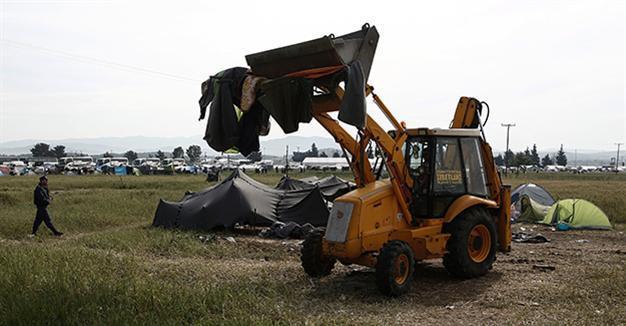Greece starts evacuating squalid Idomeni migrant camp
IDOMENI - Agence France-Presse
 Hundreds of Greek police May 24 began clearing the overcrowded Idomeni camp, a migrant flashpoint where thousands of desperate refugees have been living for months in squalid conditions.
Hundreds of Greek police May 24 began clearing the overcrowded Idomeni camp, a migrant flashpoint where thousands of desperate refugees have been living for months in squalid conditions.The overcrowded and muddy camp on the Macedonia border has become a potent symbol of the human suffering and chaos as Europe struggles to cope with its worst migrant crisis since World War II.
In an operation that began shortly after sunrise, Greek police put more than 1,000 people on buses to newly opened camps near Greece's second city Thessaloniki, about 80 kilometres (50 miles) to the south.
"The operation ... is taking place slowly and in a calm atmosphere. There has not been any need to use force," government migration spokesman Yiorgos Kyritsis told AFP.
Most media were kept at a distance, but footage and images handed out by state TV ERT and state agency ANA, who were allowed access, showed migrants queueing up to board buses and being driven away, some waving at the camera.
Many carried their worldly goods in huge bin bags, while others piled belongings into pushchairs, watched at a distance by groups of dark blue-clad police in white helmets.
A group of children -- one of them a young boy who struggled over the bumpy ground in a wheelchair -- played nearby as they waited for their turn to leave.
Authorities said priority would be given to unaccompanied minors and single-parent families.
The transfer comes after a brutal winter of freezing rain and mud which saw many people trying to force their way across the border, sometimes resulting in violent encounters with the Macedonian police.
Around midday, bulldozers moved in to clear out tents, according to tweets from activists at the camp.
Many in the camp are fleeing war, persecution and poverty in the Middle East and Asia.
And Doctors Without Borders (MSF) representative Vicky Markolefa told AFP there was "high insecurity" and "an increase in stress" for the migrants who are "not fully aware of where they are going and what will come for them in the next days."
In Geneva, the UN refugee agency said it was sending additional staff to help the process.
"It's important that organised movements are voluntary, non-discriminatory, and based on well-informed choices by the individuals at the moment," UNHCR spokesman Adrian Edwards told reporters.
However Markolefa noted that a police cordon thrown around the camp -- mainly to keep media out -- had also prevented access for many humanitarian workers.
"This complicates food handout efforts and sanitation maintenance for those who will remain in the camp," she told AFP.
At its height, more than 12,000 people crammed into Idomeni, a camp originally opened by aid groups last year to accommodate just 2,500 people during what was, at the time, a short procedure to cross the border.
But the camp exploded in size after Balkan states began closing their borders in mid-February to stem the human tide seeking passage to northern Europe.
On May 23, Kyritsis said the operation to clear all 8,400 people living there would take at least 10 days.
Officials have said 6,000 spots are available at reception centres, and that most of the migrants are to be moved to camps at former industrial facilities near Thessaloniki.
Many of the camp's residents are women and children desperate to be reunited with male relatives who have forged ahead on their own -- with the aid of smugglers -- hoping to find a place of refuge for their families in EU states more financially viable than debt-hit Greece.
The leftist government of Greek Prime Minister Alexis Tsipras has for months been trying to persuade migrants to move away from makeshift tent encampments at Idomeni and at the port of Piraeus for their own comfort and safety.
Over the past two weeks, Greek officials have managed to convince some 2,500 people to leave Idomeni, while the number at Piraeus was brought down from around 5,000 people in March to 1,500.
But many are wary of relocating to organised camps away from the border or Athens, because it could be harder to find people-smuggling contacts.
There are over 54,000 migrants stranded in Greece, according to government estimates.
Meanwhile, around 2,000 migrants seeking to reach Europe from Africa were plucked to safety from unseaworthy boats in the Mediterranean in 15 operations off the coast of Libya on May 23, the Italian coastguard service said.
So far this year, the International Organisation for Migration says an estimated 190,000 migrants and refugees have entered Europe by sea, arriving in Italy, Greece, Cyprus and Spain. Another 1,359 have died en route.
















